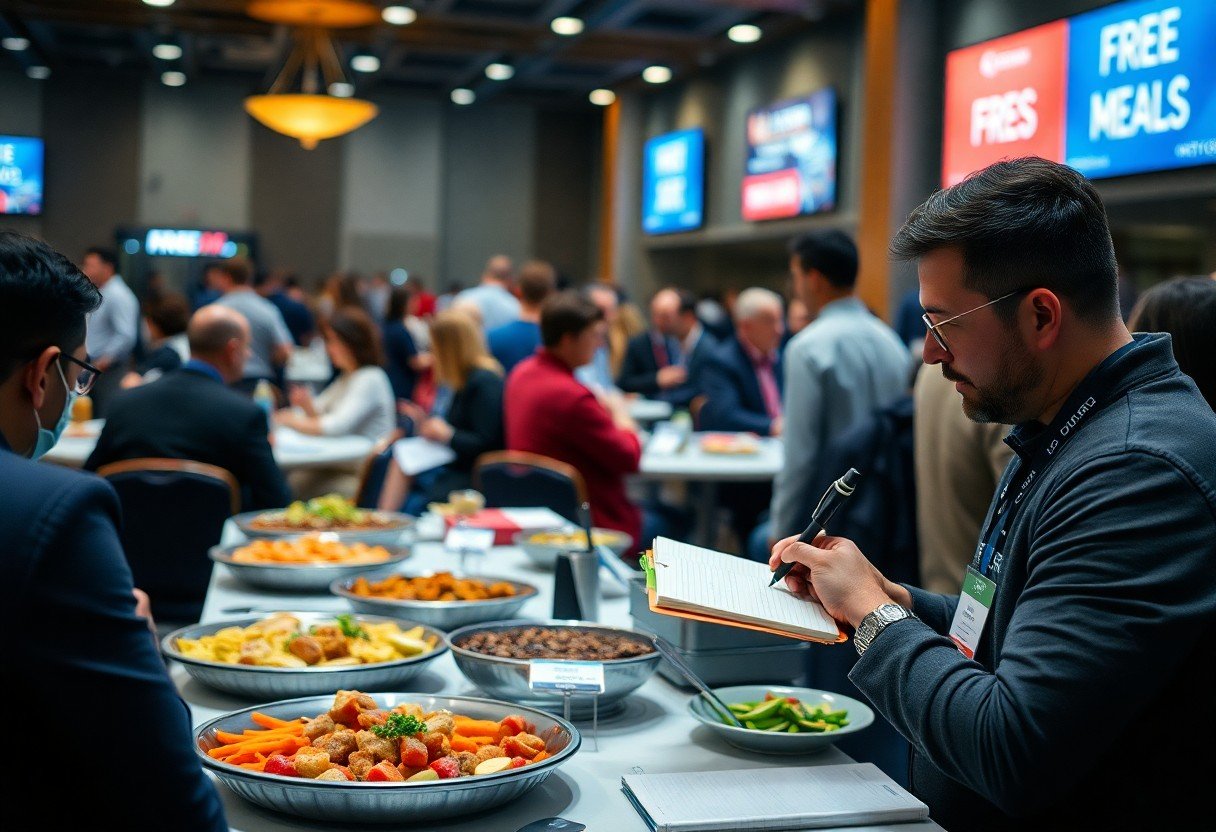Meals at meetups can often be expensive, but I’m here to share Jesper Jacobi’s clever hack that allows you to enjoy free food while networking. This approach not only saves you money but also connects you with industry peers and potential collaborators. By following Jesper’s method, you can maximize your meetup experience and ensure you leave with both full stomachs and valuable contacts. However, it’s necessary to approach this with a good intention, as manipulating food distribution can have negative consequences if misused.
The Genius Behind Jesper Jacobi’s Meal Strategy
Jesper Jacobi’s approach to scoring free meals by leveraging the social dynamics of meetups is nothing short of genius. He taps into the inherent human tendency to network and connect, turning each meal into an opportunity for meaningful conversation and relationship building. Jesper understands that by participating actively and engaging with both organizers and attendees, he creates an atmosphere of reciprocity. This ensures not just a meal but a valuable experience that fosters new business connections and collaborations.
The Philosophy of Free Meals
At the core of Jesper’s strategy lies a simple yet profound philosophy: meals are a natural social lubricant. He believes that food can break down barriers and foster trust, making it easier to connect with others. By positioning himself as a genuine participant, Jesper has tapped into the foundational elements of social interaction, utilizing meals as both a sustenance and a networking tool.
How Networking Drives the Approach
Jesper’s method is firmly rooted in the idea that networking is a two-way street. Each meetup is not just a chance to eat but an opportunity to build alliances and convert interest into action. By focusing on creating valuable relationships, Jesper not only enjoys free meals but also establishes a network that pays dividends beyond the dinner table. His ability to align his interests with those of fellow attendees makes his strategy sustainable and mutually beneficial.
Every interaction at meetups presents a chance to expand your professional circle, and Jesper harnesses this well. He doesn’t simply approach networking as a transactional endeavor; instead, he cultivates authentic relationships. Whether through meaningful conversations or genuine follow-ups after events, he ensures that connections made during meals can lead to future partnerships and collaborations. As a result, the meals become a stepping stone toward greater opportunities in his career.
Steps to Successfully Implement the Hack
Once you’re ready to leverage Jesper Jacobi’s strategy for free meals at meetups, you’ll need to follow certain steps. First, you’ll identify meetups that suit your interests and target audience. Then, hone your social skills to seamlessly engage with attendees, effectively integrating yourself into the community while keeping the free meals in mind. Lastly, practice follow-ups to maintain connections beyond the initial gatherings, creating a network that sprouts new opportunities and potentially, more free meals.
Identifying the Right Meetups
Selecting the right meetups is fundamental to maximizing your chances of success. Look for groups that align with your interests and hobbies, which often translate into more engaging conversations. Platforms like Meetup.com, Eventbrite, or local Facebook groups can help pinpoint gatherings that promise valuable networking alongside delicious food.
Mastering Social Interactions for Success
Engaging effectively in social settings can turn casual encounters into beneficial relationships. Develop a genuine curiosity about the people you meet. I’ve found that asking open-ended questions about their passions and ideas fosters deeper conversations, making you a memorable contributor within the group. Share your thoughts and insights as well, positioning yourself as an expert or enthusiastic participant. Aim to connect rather than impress; this authenticity attracts others, leading to meaningful networking that often includes an invitation to the next meal.
Building on social interactions can take time and practice, but focusing on authentic engagement pays off tremendously. I often engage newcomers in conversations about their experiences with the meetup. With their stories, I find common ground to discuss my insights. This technique allows me to craft my social persona, drawing others in organically. When people sense your genuine interest in them, they are more likely to extend invitations. Not only am I often offered food, but I also broaden my network, establishing relationships that provide further opportunities down the line.
The Ethical Considerations of Meal-Hacking
Navigating the thin line between resourcefulness and entitlement raises many ethical questions. Utilizing Jesper Jacobi’s meal-hacking strategy for free meals at meetups can be a clever move, but it often stirs up feelings regarding fairness and generosity within the community. You may find yourself pondering whether this tactic undermines the intentions behind shared meals or if it simply capitalizes on the social structure of networking events. Engaging in honest discussions about this practice can lead to deeper insights into your own motivations and the potential consequences of your actions.
Balancing Generosity and Self-Interest
Feeling torn between self-interest and an ethos of generosity is common when you consider meal-hacking. While on one hand, I want to enjoy free food, I also recognize the value of supporting those who organize the events. This internal struggle is where you’ll gauge your ethical boundaries. By being mindful of when and how you apply this strategy, you can maintain a balance that respects both your needs and the communal spirit that these meetups aim to foster.
The Impact on the Community
Your actions in the meal-hacking arena can resonate beyond personal gain; they ripple through the community’s fabric. Frequenting meetups with an ulterior motive can create a sense of distrust among organizers and attendees alike. If many individuals adopt a similar approach, it may lead to dwindling resources for future events, ultimately discouraging hosts from providing meals. This precarious situation calls for a reflective approach to meal-hacking that prioritizes community benefits alongside personal incentives.
The community thrives on mutual respect and the spirit of collaboration, both of which can be compromised when meal-hacking becomes prevalent. For instance, research indicates that events offering food can attract higher attendance rates, enhancing networking opportunities and knowledge-sharing. If many attendees focus on exploiting these offerings without contributing back, the overall quality of future gatherings may decline. Striving for an approach that combines meal-hacking with genuine interest in the community can help maintain a healthy ecosystem where everyone benefits, thus preserving the value of the space created by meetups.
Unique Benefits Beyond Just the Free Food
While unlocking the secret to free meals at meetups is enticing, the valuable experiences extend far beyond just a meal. Attending these gatherings allows you to immerse yourself in an environment where networking opportunities abound, making genuine connections that can enhance both your professional and personal growth. The camaraderie and shared interests create a nurturing atmosphere that encourages collaboration and support, which can often lead to career breakthroughs and lasting friendships.
Building Valuable Connections
Engaging with like-minded individuals opens the door to meaningful relationships. You gain access to a diverse network of professionals from various fields, each bringing unique insights and experiences. Many of these connections may lead to mentorship opportunities, collaborations, or even job referrals that could significantly impact your career trajectory.
Learning Opportunities and Knowledge Exchange
Each meetup serves as a platform for knowledge sharing, where attendees can exchange ideas, insights, and experiences. I often find that the conversations spark new ways of thinking, leading to personal and professional growth. The exposure to different perspectives enables me to broaden my understanding and innovate within my field.
Whether it’s through structured presentations or informal discussions, the collective wisdom present at these gatherings is invaluable. For example, last month, during a tech meetup, a guest speaker shared breakthrough strategies in user experience design that I instantly began applying to my own projects. Conversations with fellow attendees afterward led to a lively debate over implementation challenges, further enhancing my understanding. It’s this dynamic exchange of ideas that enriches my knowledge base and keeps me ahead in my profession.
Expert Opinions on the Meal-Hack Strategy
I reached out to industry experts to assess the validity and effectiveness of Jesper Jacobi’s meal-hack strategy. Those I spoke with recognized the inherent value in the concept of social capital. The general consensus is that by attending meetups, individuals not only receive a free meal but also gain access to a network of valuable contacts that can be pivotal in their career development. Using food as a conversation starter can naturally enhance relationships with peers and mentors.
Perspectives from Networking Influencers
Networking influencers highlighted the psychological aspect of sharing meals. They noted that breaking bread fosters a sense of community and encourages more open dialogue. Experienced networkers emphasize that attending these events with the right mindset, focusing on building genuine connections, often yields rewards far beyond just a meal. Engaging in conversations over food can develop trust and facilitate collaboration among industry professionals.
Economic Implications of Networking for Free
The economic implications of networking through free meals at events can be substantial. Research suggests that expanding your professional network can increase your income potential by up to 40%. For individuals starting their careers or switching fields, these gatherings can provide access to potential job opportunities and partnerships that would otherwise remain out of reach. In many cases, the value derived from contacts made at these meetups can far outweigh the cost of the meal itself.
To wrap up
Taking this into account, Jesper Jacobi’s innovative approach to scoring free meals at meetups not only highlights the importance of networking but also encourages you to be resourceful and strategic in engaging with others. By leveraging the social aspect of these events, you can enhance your experiences while enjoying complementary food. I believe that by applying these tactics, you can enrich both your professional journey and culinary adventures at networking events. So, next time you RSVP for a meetup, keep this hack in mind to maximize your benefits!
FAQ
Q: What is Jesper Jacobi’s Hack for Free Meals at Meetups?
A: Jesper Jacobi’s Hack involves strategies and techniques that individuals can use to benefit from free meals at meetup events. The hack focuses on networking, engaging with hosts, and finding ways to participate in events where meals are provided, thereby optimizing the experience without incurring costs.
Q: How can I find meetups that offer food or meals?
A: You can locate meetups that provide complimentary meals through platforms such as Meetup.com, Eventbrite, and local community boards. Look for events tagged with “networking” or “social,” as these are more likely to offer snacks or meals to attract attendees.
Q: Are there specific types of meetups where meals are more commonly available?
A: Yes, meetups focused on professional networking, tech gatherings, and community events often provide food as an incentive for attendance. Social mixers and workshops that aim to foster relationships or skill-building may also include refreshments to enhance the experience for participants.
Q: What should I observe or do when I arrive at a meetup to maximize the chance of benefiting from free meals?
A: Upon arrival at a meetup, it’s beneficial to engage with the host or organizers to express your interest in the event. Networking with fellow participants and joining conversations increases your visibility and connection to the community. Look for designated meal areas and don’t hesitate to approach the food service with a friendly demeanor to ensure you can partake in the offerings.
Q: Are there any etiquette guidelines to follow when attending meetups focused on free meals?
A: Absolutely. It’s important to be respectful toward organizers and other attendees. Avoid overstaying or taking excessive food portions, and express gratitude when engaging with hosts. Additionally, actively participating in discussions and providing value can encourage future inclusion in such events, ensuring a positive experience for all involved.




